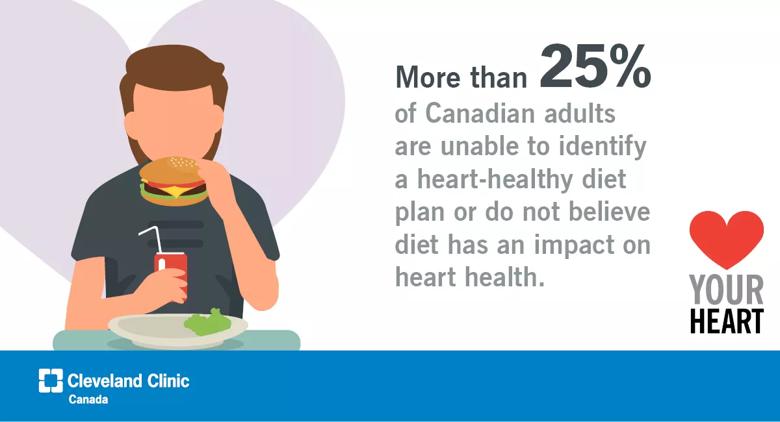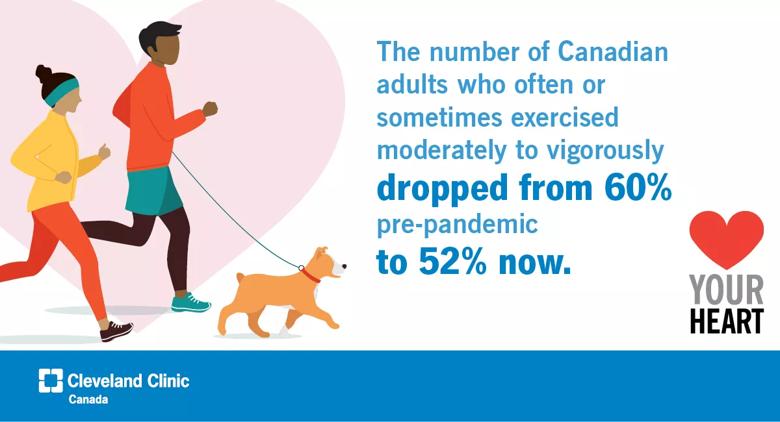Survey of adults published during Heart Month also finds COVID-19 pandemic impacted negatively on activity levels, particularly among older generations

TORONTO: A survey by Cleveland Clinic Canada, part of Cleveland Clinic’s global health system, has found that more than a quarter (27%) of adults across the country say they are either unable to identify a heart-healthy eating plan (23%) or they do not believe diet has anything to do with heart health (4%), while the overall majority do not follow any specific diet plan (65%).
When presented with a list of 10 diets from which Canadians could choose up to three options, the Mediterranean diet was most identified as among the most heart-healthy, with 32% naming it, followed by a low-carbohydrate diet (27%) and a vegetarian diet including eggs and dairy (25%). In contrast, only 7% of Canadians actually follow a Mediterranean diet, 10% a low-carbohydrate diet, and 7% a vegetarian diet, with 65% of all Canadians reporting that they do not follow any specific diet plan.

Image content: This image is available to view online.
View image online (https://assets.clevelandclinic.org/transform/705f1c56-b045-4f38-8a14-b5f42291235e/22-CCC-2729359-Can1-1200x650-1_jpg)
Also notable, was a generation-related difference in perceptions of the Mediterranean diet, which was identified as among the most heart-healthy diets by 46% of Boomers (ages 58-76) and the Silent Generation (ages 77 and above), whereas only 14% of Gen Z (ages 18-25), 24% of Millennials (ages 26-41) and 28% of Gen X (ages 42-57) recognized it as such.
“The survey results indicate that more awareness is needed regarding the considerable impact that diet and other lifestyle habits can have on heart health. It is important that people realize that a large percentage of heart disease is preventable through a healthier diet, avoidance of weight gain, regular exercise, and not smoking. Given that heart disease is the second leading cause of death and a leading cause of hospitalization in Canada, this could have an enormous positive impact,” said Anil Maheshwari, M.D., Medical Director of the Weight and Lifestyle Management Program at Cleveland Clinic Canada.
“Awareness of the impact of lifestyle choices is particularly important during the current global health crisis as our survey also shows a general decrease in activity levels after the onset of the COVID-19 pandemic, which matches up with what I’m seeing in most of my patients,” he added.
According to the survey results, Canadian adults reported a decrease in the amount of exercise they did before and after the onset of the pandemic in March 2020. The number of people who often or sometimes exercised moderately to vigorously dropped from 60% pre-pandemic to 52%, while those who said they exercised rarely or never rose from 40% pre-pandemic to 48%.
Notably, this drop in physical activity varied across age groups, with the smallest decrease seen in Gen Z, where those who reported exercising moderately or vigorously sometimes or often fell only three percentage points post-pandemic (55% vs. 52%),whereas among Millenials it decreased from 65% to 56% and among Gen Xers it decreased from 57% to 48%.

Image content: This image is available to view online.
View image online (https://assets.clevelandclinic.org/transform/8c1e3c35-e960-45b0-9a1a-249a9fbc70ec/22-CCC-2729359-Can2-1200x650-1_jpg)
The survey also investigated Canadians’ knowledge of other factors that can increase risk of heart disease and found that the majority of Canadians were able to identify key risk factors such as obesity (77%), smoking/vaping (74%), not exercising enough (66%), and high blood pressure (75%). However, many Canadians did not know that the following less-prominent factors can indicate increased risk for heart disease: lack of sleep (identified by 50%), poor dental health (identified by 38%) and over-exercising (identified by 20%).
Cleveland Clinic, a global health system first established in the US in 1921, regularly commissions heart health surveys in various countries. The Canadian survey was conducted last month and the results are being published to coincide with Heart Month, an annual initiative organized in Canada by the Heart and Stroke Foundation to raise awareness around the importance of cardiovascular health.
Cleveland Clinic is the No.1 hospital in the world for cardiac surgery, according to Newsweek’s World’s Best Specialized Hospitals of 2022. Cleveland Clinic has been ranked the No. 1 hospital in the country for cardiology and cardiac surgery for 27 years in a row by U.S. News & World Report.
Cleveland Clinic has been a leader in heart care since the 1940s, when Arda Green, M.D., and Irvine Page, M.D., led research teams that isolated serotonin and linked high blood pressure to heart disease.
Cleveland Clinic’s cardiac-related discoveries and “firsts” have continued since then. Cleveland Clinic has:
Survey methodology: All figures, unless otherwise stated, are from YouGov Plc. Total sample size was 1017 adults. Fieldwork was undertaken from 17- 21 January 2022. The survey was carried out online. The figures have been weighted and are representative of all Canadian adults (aged 18+).
About Cleveland Clinic Canada
Cleveland Clinic Canada is the Canadian location of Cleveland Clinic, a global nonprofit academic medical centre that has provided world class patient care to people from around the world since 1921. Cleveland Clinic Canada’s multi-disciplinary team of physicians and wellness experts provide in-person care at our clinics in Toronto as well as virtual care across Canada. Their medical experts also work with companies to help them manage organizational risk and improve the health of their employees. Patients benefit from the expertise of dozens of Canadian physicians, specialists and wellness experts, as well as over 3,500 physicians and specialists across the Cleveland Clinic network. Visit clevelandclinic.ca to learn more.
About Cleveland Clinic
Cleveland Clinic is a nonprofit multispecialty academic medical center that integrates clinical and hospital care with research and education. Located in Cleveland, Ohio, it was founded in 1921 by four renowned physicians with a vision of providing outstanding patient care based upon the principles of cooperation, compassion and innovation. Cleveland Clinic has pioneered many medical breakthroughs, including coronary artery bypass surgery and the first face transplant in the United States. U.S. News & World Report consistently names Cleveland Clinic as one of the nation’s best hospitals in its annual “America’s Best Hospitals” survey. Among Cleveland Clinic’s 70,800 employees worldwide are more than 4,660 salaried physicians and researchers, and 18,500 registered nurses and advanced practice providers, representing 140 medical specialties and subspecialties. Cleveland Clinic is a 6,500-bed health system that includes a 173-acre main campus near downtown Cleveland, 19 hospitals, more than 220 outpatient facilities, and locations in southeast Florida; Las Vegas, Nevada; Toronto, Canada; Abu Dhabi, UAE; and London, England. In 2020, there were 8.7 million total outpatient visits, 273,000 hospital admissions and observations, and 217,000 surgical cases throughout Cleveland Clinic’s health system. Patients came for treatment from every state and 185 countries. Visit us at clevelandclinic.org. Follow us at twitter.com/ClevelandClinic. News and resources available at newsroom.clevelandclinic.org.
Editor’s Note: Cleveland Clinic News Service is available to provide broadcast-quality interviews and B-roll upon request.